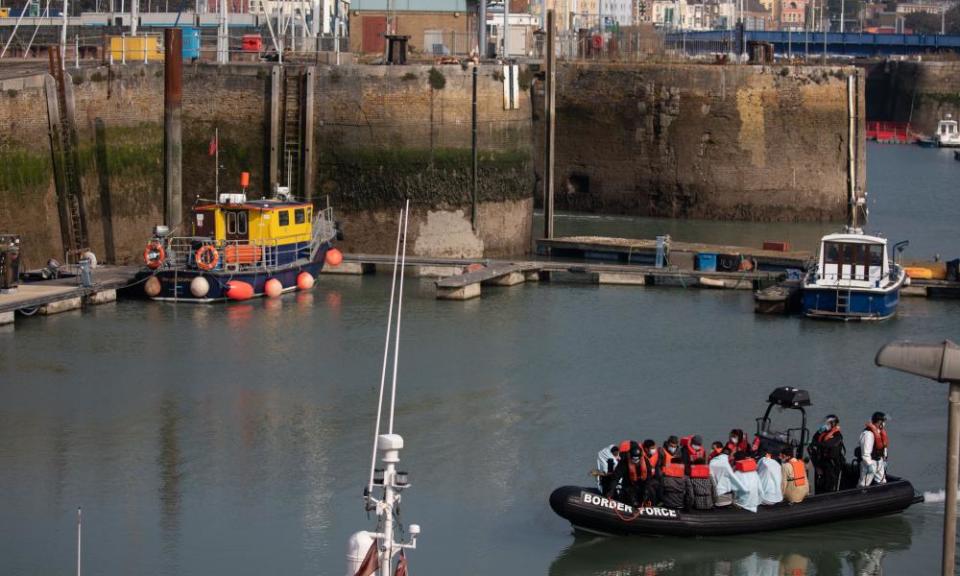Migrants who crossed Channel could be sent to detention centre

People who have crossed the Channel in small boats could be housed in a detention centre criticised for inhumane conditions under plans drawn up by the Home Office.
The Guardian has confirmed that Priti Patel’s office has authorised discussions to use government accommodation including parts of a controversial immigration removal centre in Lincolnshire.
The move has been criticised as a “shameless rebranding” of the detention system by one migrant support group. Many recent arrivals are asylum seekers who have the right to live within the community.
It comes amid growing criticism of the Home Office from Conservative MPs in Kent over the housing of recent migrants at barracks or local hotels.
The UK is dealing with record levels of arrivals across the Channel in small boats, an issue which has been seized upon by far right activists, including Nigel Farage.
An informed source confirmed that several properties are under discussion, including some overseen by the Ministry of Justice. Morton Hall, an immigration removal centre in Lincolnshire, is one of the places under discussion.
“These people are not in detention, but they must be housed somewhere. It makes sense to use government properties,” the source said.
Morton Hall, in Swinderby, Lincolnshire, is expected to revert to being a prison next year, a function it performed between 1985 and 2011, when it held female inmates.
The detention centre, which can accommodate 392 people and is run by the prison service, is particularly unpopular because of its remote location and jail-like conditions.
An inspection report by Her Majesty’s Inspectorate of Prisons earlier this year found high levels of self-harm, violence and use of force at Morton Hall.
It is not known if the proposals suggest that those who might be housed at Morton Hall will include children.
Minnie Rahman, the public affairs manager at the Joint Council for the Welfare of Immigrants, said: “It is completely inappropriate that the Home Office is intending to use detention centres – which are essentially prisons – to house people seeking asylum. This is nothing more than shameless rebranding of the detention estate. These places have longstanding and well-documented records of abuse and are simply not fit to accommodate those in need of protection.”
The first of about 400 people, including families, arrived at temporary accommodation at Napier barracks near Folkestone, Kent, on Monday.
Formerly part of Shorncliffe army camp, Napier was one of five barracks at the site in 2011, alongside Burgoyne, Sir John Moore, Risborough and Somerset.
Far right activists have claimed falsely that refugees are given £40 a week and are displacing homeless veterans.
A total of 393 migrants arrived in England by small boats on Tuesday, the Home Office confirmed. According to PA Media analysis, this would take the total to nearly 7,000 arrivals by small boats this year.
Dozens of people thought to be migrants were seen arriving in Dover harbour wrapped in blankets and wearing lifejackets. They included children, including one in a pink jacket who was too young to walk.
The French authorities prevented 10 crossings on Tuesday involving 91 people.
The clandestine channel threat commander, Dan O’Mahoney, said: “Yesterday I met with the French ambassador to the UK where I reiterated the urgency to tackle the issue. We discussed how best the UK and France can use new tactics and operational activity to stop the boats leaving French shores in the first place.
“France is a safe country and asylum seekers already in France should claim asylum there.”
The home secretary has a legal obligation to provide support including accommodation to asylum seekers who would otherwise be destitute.
The Home Office did not respond to questions asking if children might be housed in secure accommodation such as Morton Hall or how many properties were under discussion with the MoJ.
A government spokesperson said: “During these unprecedented times we have worked tirelessly with local authorities and other partners, including other government departments, to provide asylum seekers who would otherwise be destitute with suitable accommodation – as we are required to do by law.”

 Yahoo News
Yahoo News 